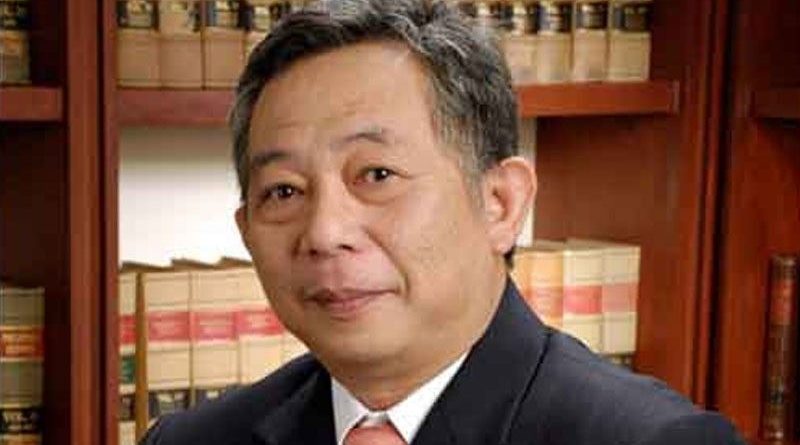LAW AND COURT: MANILA -Alfredo Benjamin Caguioa Associate Justice : Supreme Court killed itself without honor

MANILA, Philippines — The Supreme Court committed a form of dishonorable suicide when it ousted chief justice Maria Lourdes Sereno.
In arguably the strongest dissenting opinion, Associate Justice Alfredo Benjamin Caguioa branded the decision granting the quo warranto petition of the solicitor general and invalidating Sereno’s appointment to the top judicial post in 2012 as seppuku but “without honor.”
Seppuku – more popularly known as harakiri – is the Japanese practice of committing suicide by disembowelment to regain one’s honor.
“I view with deep shame and regret this day when the Court has ousted one of its sitting Members upon the prodding of a mere agency of a separate coordinate department… This case marks the time when the Court commits seppuku – without honor,” Caguioa stressed in his 64-page dissenting opinion.
.
He agreed with the argument of Sereno that she could only be removed through impeachment in Congress and not through quo warranto proceedings.
“Traveling this prohibited road will be at the expense and to the extreme prejudice of the independence of the entire judiciary, the independence of the Court’s individual members, and the freedom of discourse within the Court,” he said.
Caguioa, an appointee of former president Benigno Aquino III in SC just like Sereno, believed the quo warranto case was “an admission on the part of the Executive Department that the grounds for impeachment… rest on shaky grounds.”
“No matter how dislikable a member of the Court is, the rules cannot be changed just to get rid of him, or her in this case,” he pointed out.
Caguioa was one of six justices who voted to dismiss the petition filed by Solicitor General Jose Calida.
The other five were Senior Associate Justice Antonio Carpio and Associate Justices Presbitero Velasco Jr., Mariano del Castillo, Estela Bernabe and Marvic Leonen.
Carpio agreed the SC has no jurisdiction over the case because only Congress can oust a sitting magistrate through impeachment process as provided under the 1987 Constitution.
But the senior magistrate concluded that the ousted chief justice is “liable for culpable violations of the Constitution and betrayal of public trust.”
Carpio believed such finding could only be “endorsed to the Senate for the impeachment trial.”
“If a court finds that an impeachable officer has committed an impeachable act, the court should refer the matter to Congress, for Congress to exercise its exclusive mandate to remove from office impeachable officers,” Carpio said in his 25-page dissenting opinion.
With Sereno’s ouster, Carpio will again serve as acting chief justice just as he did in 2012 after the ouster of the late chief justice Renato Corona after impeachment trial in Senate.
Bad precedent
Velasco agreed with Carpio that the quo warranto petition of Calida should be dismissed by the Court – but based on another ground.
In his separate dissenting opinion, Velasco stressed the SC ruling on Calida’s petition was premature, as it still needs trial in court.
Leonen took a more hardline stance in his dissenting opinion. He believed the SC has no power to remove the chief justice and that the petition should have been dismissed outright.
“Even if the Chief Justice has failed our expectations, quo warranto, as a process to oust an impeachable officer and a sitting member of the Supreme Court, is a legal abomination. It creates a precedent that gravely diminishes judicial independence and threatens the ability of the Court to assert the fundamental rights of our people,” Leonen stressed.
He said the ruling has set a bad precedent: “We render this Court subservient to an aggressive Solicitor General. We render those who present dissenting opinions unnecessarily vulnerable to powerful interests.”
Lastly, Del Castillo slammed Calida for leading the high court to veer away from the Constitution.
“In instituting this quo warranto proceeding, the SolGen urges this Court to take the road not taken. I am not inclined to take part in any constitutional adventurism, and I intend to remain within the clearly confined course that the framers of our Constitution have delineated,” he added.
In the decision approved by a majority of eight justices, the SC held that Sereno’s appointment as the 24th chief justice was null and void because she did not meet the requirement of integrity for such post.
A threat to democracy
The majority found Sereno’s failure to file her complete statements of assets, liabilities and net worth (SALNs) while teaching law in University of the Philippines and when she applied for the chief justice post as a clear indication of lack of integrity and dishonesty.
The Court also ruled that it has the power to remove Sereno through quo warranto despite her being an impeachable officer and that the case could be resolved independently from the impeachment case before the Congress.
Lastly, the SC explained the one-year prescription period for quo warranto cases is not applicable to the case against Sereno.
The 153-page ruling was penned by Associate Justices Noel Tijam with Associate Justices Teresita Leonardo-de Castro, Diosdado Peralta, Lucas Bersamin, Francis Jardeleza, Samuel Martires, Andres Reyes Jr. and Alexander Gesmundo concurring.
Apart from Sereno’s ouster, the SC also issued a show cause order requiring her why she should not be penalized for supposedly violating Code of Professional Responsibility and Code of Judicial Conduct “for transgressing the sub judice rule and for casting aspersions and ill motives to the members of the Supreme Court.”
Sereno vowed to fight what she branded as threat to democracy.
“We must gather our forces that can help in advancing our democracy… The fight for democracy, truth and accountability must continue and there must be no letup,” Sereno said in a press conference Friday, hours after her ouster from the SC. –With Helen Flores, Gerry Lee Gorit / Philstar.com/File Photo / Edu Punay (The Philippine Star) – May 14, 2018 – 12:00am









